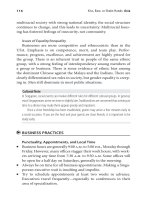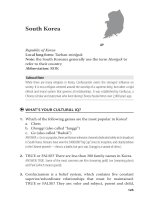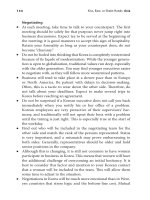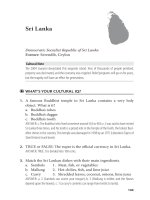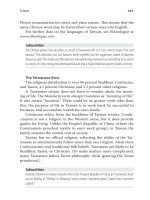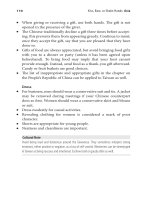Tài liệu How to Do Business in 12 Asian Countries 23 docx
Bạn đang xem bản rút gọn của tài liệu. Xem và tải ngay bản đầy đủ của tài liệu tại đây (130.01 KB, 9 trang )
oered again, accept; it is considered an honor to have the last bit
of food.
●
To entertain a small group, take them to an excellent restaurant
in a prestigious hotel. For a large group, arrange a buet supper.
Always include ai wives in business dinners.
●
Expect to eat with Western-style forks and spoons. Keep the fork
in the le hand and the spoon in the right (reverse this if you are
le-handed). Cut with the side of the spoon, not the fork. Use the
fork to push food onto the spoon.
●
Drink tea or beer with meals. Drink water only if you have seen it
being poured from a bottle.
●
Many ais smoke aer dinner, but do not be the rst to light up.
Always pass cigarettes around to the men at the table. Although
traditional ai women do not smoke or drink in public, it is
acceptable for Western women to do so.
Cultural Note
Monks are not permitted to touch the opposite sex. If you are female, do not expect them to
shake your hand. If you need to give something to a monk, place it in front of him, or give it to a
man to pass along. Monks are not expected to thank you for a contribution either—however,
you always thank them for providing you with a means to better your life today, and in the
future.
●
3
PROTOCOL
Greetings
●
e graceful, traditional ai greeting is called a wai. Press your
hands together as though in prayer, keeping arms and elbows
close to your body, and bow your head to touch your ngers. e
height of your hands is related to the level of deference or respect
you are giving to the person you greet. e higher your hands, the
more respect you show.
●
A wai is used for both meeting and departing.
●
Younger people are expected to greet an elder rst, and they may
or may not return the gesture.
Thailand
179
180
Kiss, Bow, or Shake Hands: Asia
●
You do not have to wai children.
●
ais will shake hands with Westerners, but they will be pleased if
you greet them with their traditional greeting.
●
When introduced to a monk, never touch him; simply give a ver-
bal greeting without shaking hands. Monks do not have to greet
you with the wai.
Titles/Forms of Address
●
Titles are very important.
●
Many ai businesspeople are Chinese.
●
Chinese names generally consist of a family name, followed by two
(sometimes one) personal names. In the name Chang Wu Jiang,
“Chang” is the surname (or clan name). He would be addressed
with his title plus Chang (Mr. Chang, Dr. Chang). For further
information on the proper titles and forms of address for Chinese
names, please see Appendix A.
●
Ethnic ais predominate in government positions, but they will
also be found in the business world.
●
Since the adoption of surnames in the 1920s, ethnic ais gener-
ally have two names. eir given name will come rst, then their
surname. Given names in ailand are oen unique, and have a
specic meaning. Only the most discerning travelers learn which
ones apply to women and which to men.
●
Address people by their title (or Mr./Mrs.) and their given (rst)
name. e short ai term for “Mr.,” “Mrs.,” or “Miss” is Khun
(although there are longer forms as well). us, former prime
minister Chatichai Choonhavan could theoretically have been
addressed as Khun Chatichai.
●
Nicknames are popular in ailand. Do not be surprised if the
ais give you a nickname, particularly if your name is hard for
them to pronounce.
Gestures
●
Public displays of aection between members of the opposite sex
are not condoned. However, members of the same sex may touch
or hold hands with one another.
●
Never, ever point your foot at anyone; it is considered extremely
rude. Don’t cross your legs with one leg resting on the other knee,
and never cross your legs in front of an older person.
●
In contrast to the foot being foul, the head is sacred in ailand.
Never touch anyone on the head, not even a child.
●
Do not pat people on the back or shoulders.
●
Give up your seat on a bus or train to a monk who is standing.
●
Never walk in front of ais praying in a temple.
●
Beckoning is done with the palm down and the ngers waved
toward the body.
Gifts
●
Gis are not opened in the presence of the giver.
●
If you are invited for a meal, bring owers, cakes, or fruit. Don’t
bring marigolds or carnations, however, because they are associ-
ated with funerals.
●
High-tech gadgets (MP3 players, etc.), local handicras from
your home, nely made pens and stationery, imported perfumes,
select liquors, cigarettes, and illustrated books from your area are
all suitable gis.
Cultural Note
Much has been written about Thailand’s sex industry. Since the proliferation of HIV
(approximately 600,000 Thais live with HIV or AIDS as of this writing), it is an even more
perilous occupation—endangering providers and patrons alike. It is projected that 40,000 to
60,000 Thais will die from AIDS-related causes each year, the majority being between twenty
and twenty-four years of age.
Dress
●
For business, men should wear a lightweight suit or slacks and a
jacket, white shirt and tie; women should wear plain, conservative
dresses or suits. Women should not wear black dresses, a color the
ais reserve for funerals or mourning.
●
Dress for success. ais are impressed with a neat appearance and
rened clothing.
Thailand
181
182
Kiss, Bow, or Shake Hands: Asia
●
In casual settings, men should wear slacks and shirts, with
or without ties; women should wear light dresses or skirts and
blouses. Short-sleeved blouses are acceptable, but sleeveless ones
are not. Both sexes may wear jeans (but may nd them too hot).
Shorts are acceptable on the streets, but not in the temples.
●
Men should wear traditional summer formal attire for formal
occasions—white jacket, black pants, and black tie; women should
wear long dresses. Black is acceptable to wear at a formal event if
it is accented with color.
●
Be certain to wear modest clothing when you visit temples—no
shorts. It is also advisable to wear old or inexpensive shoes when
visiting temples. You must remove them before entering, and once
in a while they may be stolen.
●
Never wear rubber thongs on the street; they are considered very
low class.
Cultural Note
Never make fun of the royal family; they are regarded as a strong unifying influence. Faced
with a fractious Parliament and a strong military, the Thai people turn to their constitutional
monarch for leadership. Visiting executives should only use the most respectful terms when
referring to the king. There is no room for criticism or humor in reference to royals—unless
you want serious repercussions. Some Thai citizens who have made negative comments about
the royal family have been charged with lèse majesté, and jailed.
183
Vietnam
Socialist Republic of Vietnam
Local long form: Cong Hoa Xa Hoi Chu Nghia Viet Nam
Local short form: Viet Nam
Cultural Note
The process of transforming from a Communist command economy to a market-oriented
economy is never easy. The government’s lack of transparency and low pay to government
officials is a recipe for corruption. Another problem is competition among government
agencies for jurisdiction over foreign investments. At present, multiple bureaucracies may
claim control over foreign-controlled business—and each of them want to impose licenses
and taxes.
●
3
WHAT’S YOUR CULTURAL IQ?
1.
Vietnam was divided into two antagonistic countries between
1956 and 1975. TRUE or FALSE: During this time, the south was
known as “e Democratic Republic of Vietnam,” while the north
chose the shorter “Republic of Vietnam.”
ANSWER: FALSE. Reverse the names. South Vietnam used the name Republic of Vietnam.
In common with other Communist-bloc countries, North Vietnam added “Democratic” to its
name (although it was nothing of the sort).
2.
e traditional Vietnamese coat of arms is decorated with four
animals. TRUE or FALSE: ree of these animals on the coat of
arms are mythological.
ANSWER: TRUE. The coat of arms boasts a dragon, a unicorn, a phoenix, and a turtle.



